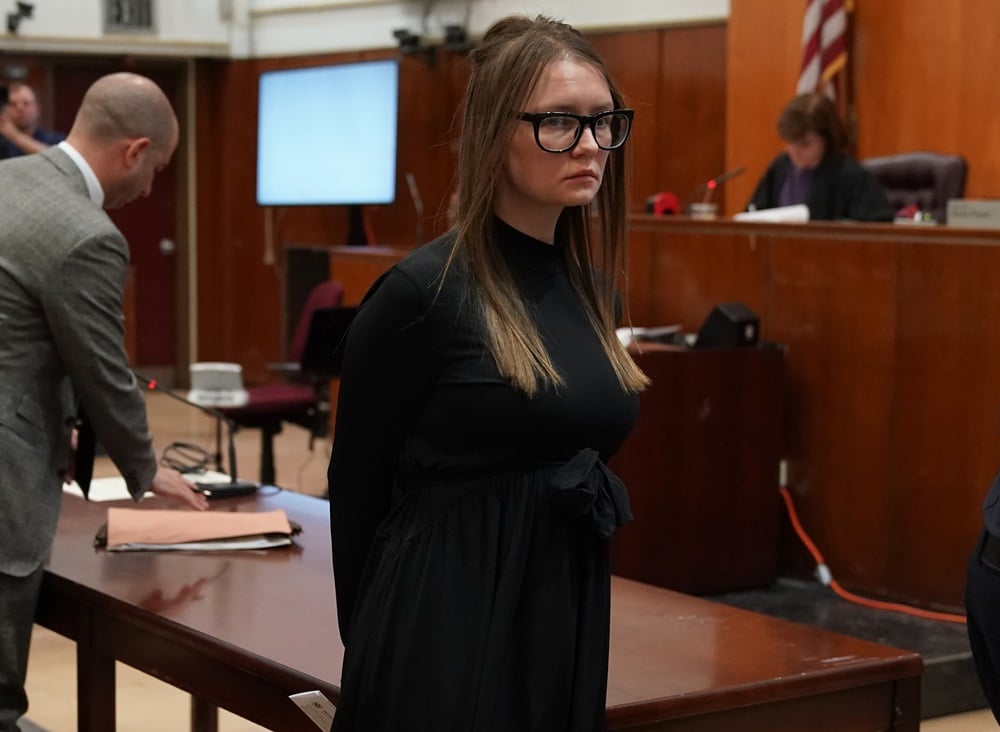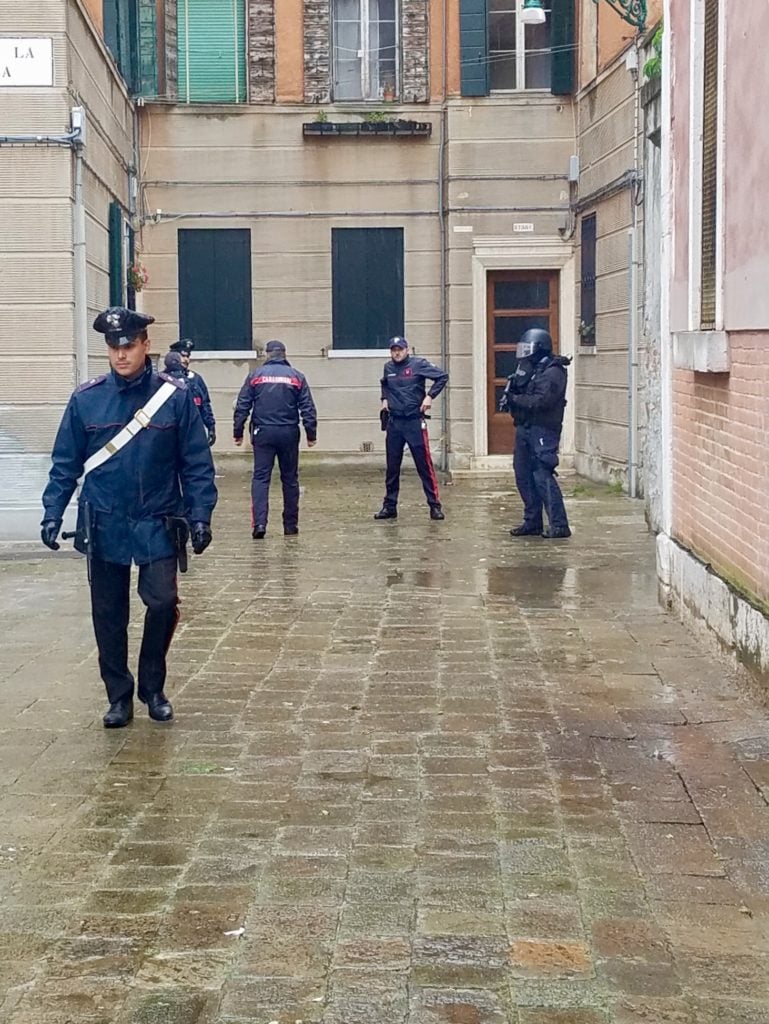Art World
Art Industry News: Why Art-World Scammer Anna Delvey Isn’t Sorry + Other Stories
Plus, the fight over Robert Indiana's estate intensifies and a fracas temporarily shuts down the Lithuania Pavilion at the Venice Biennale.

Plus, the fight over Robert Indiana's estate intensifies and a fracas temporarily shuts down the Lithuania Pavilion at the Venice Biennale.

Artnet News

Art Industry News is a daily digest of the most consequential developments coming out of the art world and art market. Here’s what you need to know this Monday, May 13.
Legal Fight Over Robert Indiana’s Estate Continues – The legal battle over Robert Indiana’s legacy has intensified. The late artist’s estate is now trying to halt reproduction of his works, including his iconic “LOVE” and “HOPE” images, because it claims the licensing agreements with other companies ended upon his death. Michael McKenzie of American Image Art and the Morgan Art Foundation have both vowed to fight the estate for the right to continue reproducing the works. “They just lost the only ally they ever had. I am going to rip them apart,” McKenzie said. “I am done being a nice guy with them. They can all go to hell.” (Portland Press Herald)
The Queen Blocks Repatriation of Ethiopian Prince’s Remains – The Ethiopian government has stepped up its longstanding effort to reclaim the remains of Prince Alemayehu, an Ethiopian prince brought to England as an eight-year-old after his father, Emperor Tewodros II died fighting the British in the Battle of Maqdala in 1868. The government first began advocating for the returns of the orphaned prince’s remains—which are buried on the grounds of Windsor Castle—12 years ago. This week, the Ethiopian ambassador to London, urged the queen to reconsider. She is said to be sympathetic to the cause, but has concerns about disturbing the remains of others buried nearby. (Daily Mail)
Anna Delvey Reveals Her Post-Release Plans – The convicted con artist told the New York Times she is “not sorry” for posing as a German heiress with an art foundation, even if she says, “I am not a good person.” It was never about the money, however, she explains: “I was power hungry.” Ahead of her trial, she had been disciplined 30 times at Rikers Island for infractions including fighting and disobeying orders. After her release from prison in four to 12 years, she hopes to move to London. Her new interests include criminal justice reform, artificial intelligence, and the banking industry. “Ideally, if all goes well, I’ll have my own investment fund,” she says. (New York Times)
Peru Will Limit Machu Picchu Access – The government will place a two-week restriction on three important areas at Machu Picchu to prevent further degradation and damage to the Inca site. From May 15 to 28, authorities will place strict limits on how many people can access the Temple of the Sun, the Temple of the Condor and the Intihuatana Stone. Tourists will now have just three hours to visit the three sites. Authorities will evaluate the impact of the new limit before applying new permanent restrictions on June 1. (AFP)
Brexit-Anxious Dealers Are Sending Art to Europe – Art exports from the UK hit a three-year high in 2018 as dealers scrambled to send works to the European Union amid fears of a no-deal Brexit. The volume of art and antiques exports from the UK to the EU soared by a staggering 64 percent to £240 million, according to a new report by law firm Boodle Hatfield. Increased demand for British art from the US also played a role in the total rise, experts say. (City AM)
Lowry’s Cricket Painting Could Sell for $1 Million – An early painting by L.S. Lowry featuring children playing cricket in an industrial landscape could sell for more than $1 million. US-based collectors Neil and Gina Smith are selling The Cricket Match (1938)—which set a world record for Lowry when it was last sold at auction in 1996 for £282,000—at Sotheby’s London on June 18. (Guardian)
Monaco Prince’s Foundation Announces Award Shortlist – The Fondation Prince Pierre de Monaco announced that the three artworks shortlisted for its international contemporary art prize: Yto Barrada’s Tree Identification for Beginners (2017); Golden Lion winner Arthur Jafa’s Love Is the Message, The Message Is Death (2016); and Rayyane Tabet’s FRAGMENTS (2016–ongoing). The €75,000 ($85,000) prize is awarded to a contemporary artist every three years. (Press release)
Jaume Plensa Installs His Sculpture on a Sacred Mountain – The Spanish sculptor has installed a work entitled Anna in the atrium of the basilica of Santa Maria de Montserrat in Catalonia. The large mesh sculpture of a girl with her eyes closed will be in place through November. “It is a reflection of the relationship of the earthly individual with the spiritual,” Plensa said during its inauguration. (El País)
Lynette Yiadom-Boakye Is Getting a Tate Survey – The London-based artist, whose imagined portraits were a highlight of the Ghana Pavilion at the Venice Biennale, will be the subject of a major survey at Tate Britain next spring (May 19–August 31, 2020). The show will present more than 80 paintings and works on paper by the artist from 2003 to the present. (The Art Newspaper)
Here’s the Worst Art in Venice – The Art Newspaper’s crack team has singled out their least favorite works at the biennale. These not-so-coveted awards go to Lorenzo Quinn for his heavy-handed Building Bridges installation near the Arsenale, Christoph Büchel’s dredged-up migrant ship, as well as the national pavilions of Egypt, Russia, and Romania. Particularly troubling is the lack of signage accompanying the ship: “Many, if not most, exhibition goers will eat and drink in the shadow of this ship (it is positioned near a cafe) with absolutely no idea of the tragedy that unfolded there.” (TAN)
Mark Bradford Gets the 60 Minutes Treatment – Anderson Cooper shines the spotlight on the 57-year-old artist’s origin story for 60 Minutes. Bradford recounts how he got his art-making start in his 30s, when he was working at his mother’s South Los Angeles beauty shop and experimenting with the endpapers he now uses frequently in his work. When he sold his first painting in 2001 for $5,000, he called his mom and said, “Girl, I think I found a way out of the beauty shop.” Now, Bradford’s works fetch up to $10 million. (CBS)
Lithuanian Pavilion Temporarily Closed by Police – Police briefly shut down the Lithuanian Pavilion’s Golden Lion-winning climate change opera at the Venice Biennale on Sunday after two people standing in line got into an altercation. (The line is long—be careful out there, people.) As word of the dispute traveled up the hour-long queue, someone thought there was a security risk and called the police. The pavilion was reopened within 40 minutes. The performance was closed briefly this morning due to unrelated technical issues with the all-important sound system, but reopened without incident. (Instagram)

The Carabinieri shut down the Lithuanian pavilion. Photo courtesy Jerry Blackman.